Metaverse is a 3D network of virtual reality simulated with the real world by using augmented reality (AR), virtual reality (VR), and blockchain technologies. Blockchain is a digital ledger that holds records of interconnected data using cryptography techniques. Blockchain technology stores NFTs data that are unique and interchangeable.
Metaverse is a virtual space where users can interact with digital objects and with each other. It is itself a real-time, persistent, infinite, self-sustaining, and decentralized platform. Blockchain metaverse is the future because it is easy to incorporate the circulation of cryptocurrency well into the metaverse. The use of blockchain and metaverse could contribute to a better living world. The core operational principles of the metaverse universe have developed and brought about a significant change.
Blockchain technology can help in the digital transformation of the metaverse. The fundamental aspects of the blockchain metaverse are as follows.
- Decentralization:
To ensure the full functionality of blockchain based metaverse, everyone needs to interact in the same virtual environment. Using such blockchain apps enables to lead a powerful decentralized ecosystem. It also allows seamless access to thousands of independent nodes for synchronization.
- Trust:
This technology implies the existence of highly-secured NFTs which are capable of transmitting digital content, private data, and authorization keys in an encrypted format. Hence, a blockchain consulting company ensures to amplify users’ trust in the virtual world by protecting their sensitive information from any third-party accessibility.
- Smart Contracts:
Smart contracts offer feasibility to regulate legal, social, economic, and other relations between users and the metaverse universe. It helps to integrate basic rules for the proper functioning of the metaverse.
- Security:
Metaverse stores data and securely synchronizes for transmission. This blockchain technology is extremely applicable to the decentralization of data storage and other data processing nodes in the metaverse.
- Interoperability:
Blockchain performs joint functioning and sharing of information in different systems without any restrictions. When it comes to blockchains in the metaverse and NFT accessibility and valuation, interoperability becomes extremely pertinent.
Applications of Blockchain Metaverse:
The blockchain applications in the metaverse are very much diverse and can bring about a remarkable change in the digital transformation.
- Inflexible in-game assets:
You can earn and sell converted in-game assets into non-fungible tokens or NFTs. It would also allow the use of VR gameplay to users for making real money that has actual value inside the metaverse.
The assets of users would remain completely undamaged even if the game is deleted; the user quits the game or any other hostile occurrence in the metaverse.
- Self-identity authentication:
When users start navigating to the metaverse, their identity also evolves. The use of blockchain apps in metaverse can keep track of the individual security and self-identity of users.
Users can secure their age, changes in profile appearance, online activity, and other unique details on the blockchain technology for transparency to prevent cybercrimes in the metaverse universe.
- Real estate in the metaverse:
Metaverse is new to the real estate market. It is envisioned that the emergence of metaverse real estate agents is going to cover the market gap. Just as in-game assets, real estate is another important feature in the metaverse.
The regulation of real estate in the metaverse is a challenging task. The real estate agents are found on professional webs that help investors, buyers, or renters to find the perfect valuable metaverse project/space. A well known blockchain app development company can help to keep a firm catalog of how real estate is created, altered, traded, and destroyed inside the metaverse.
- Skilled talent in metaverse:
The advent of the metaverse platform has opened numerous employment opportunities. The metaverse universe has been conducting recruitment drives to hire more skilled specialists.
People with experience in AR and VR technologies have a better chance of getting a job in the real estate of the metaverse. Metaverse platforms are hiring efficient tech talents who have experience in managing game and real estate metaverse.
- Creator incentivization:
To be more precise, this will be one of the first applications of blockchain technology in the metaverse. For example, last year, Epic Games sued Apple for charging a 30% extra fee for their famous game, Fortnite.
Many other issues can be cropped in the metaverse. The introduction of creator incentivization using blockchain technology is to ensure that there are no random, unfair constraints to govern the exchange inside the metaverse.
Will blockchain metaverse enable digital transformation?
Blockchain technology in the metaverse can contribute a lot to digital transformation. The combination of blockchain technology with metaverse will prove beneficial for the internet or Web technological advancement.
Metaverse will allow users to own their data and not worry about any interference from third parties. The use of blockchain applications in metaverse will enable users to emerge in immersive digital space to experience complete autonomy and trust within the metaverse.
Conclusion:
Blockchain will remain an integral and vital part of the metaverse universe, as it allows users to safeguard their digital assets in a virtual atmosphere. Users can sell and earn NFTs to benefit from the digitized economy of the metaverse. It will remove any physical work stress and help to build a limitless virtual space for individuals.





